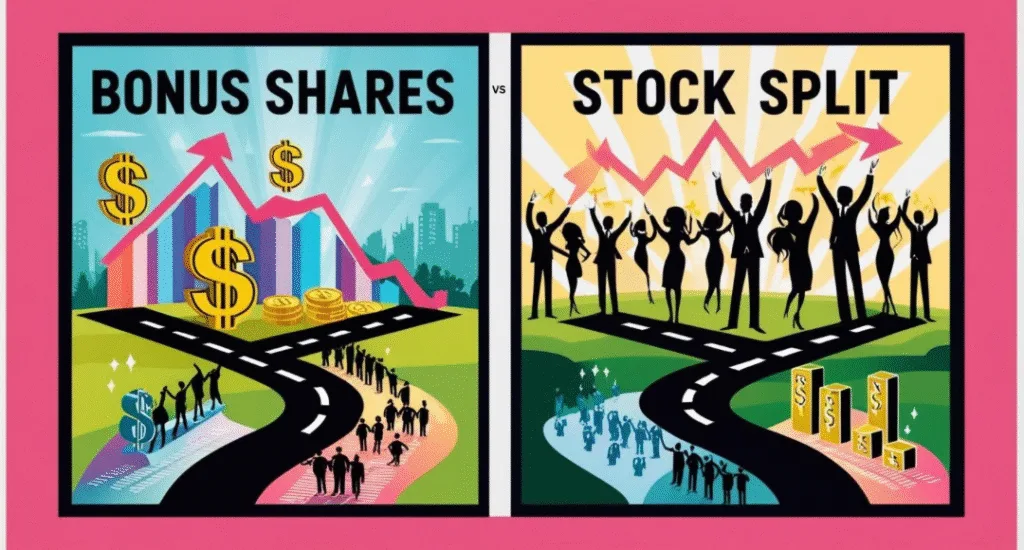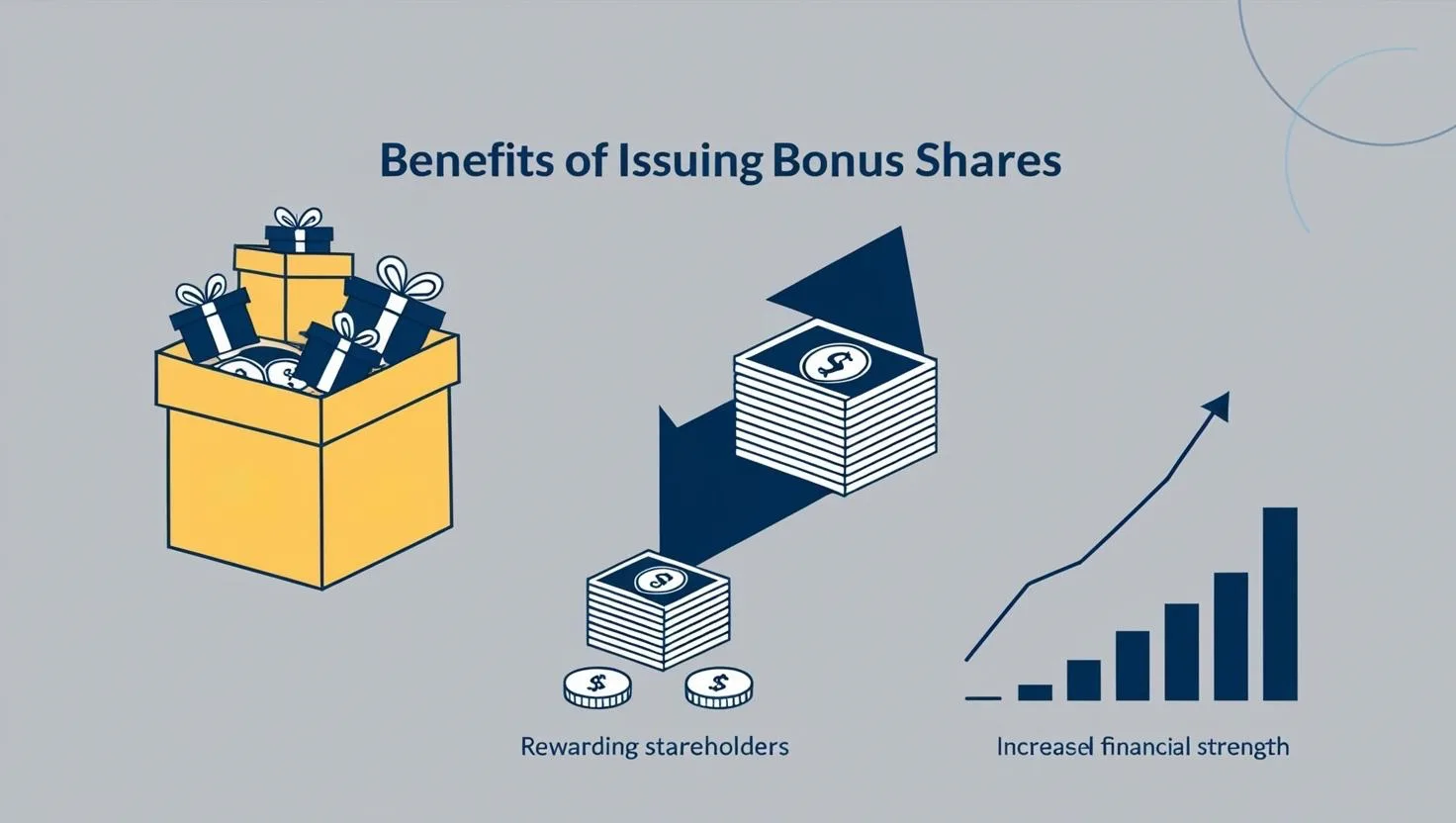Investing in stocks, you might come across terms like bonus shares and stock split. Both involve issuing additional shares to existing shareholders, but they serve different purposes and impact stock prices in different ways. In this article, we’ll cover:

- What bonus shares and stock split are
- Key differences between bonus shares and stock split
- How they affect shareholders and stock prices
- Why companies issue them
- Tax implications
- Real-world examples
By the end, you’ll have a clear understanding of these corporate actions and how they impact your investments.
Definition
Bonus shares are additional shares issued by a company to existing shareholders free of cost, in proportion to the shares they already hold. These shares are issued from the company’s retained earnings or free reserves, meaning they don’t involve new cash inflow.
Suppose you own 100 shares of a company, and the company announces a 1:2 bonus issue. This means for every two shares you own, you will receive one additional share.
- Before the bonus issue: 100 shares
- Bonus shares received: 50 shares
- Total shares after the bonus: 150 shares
The stock price usually adjusts downward proportionally after a bonus issue, so the overall value of your holdings remains the same initially.

Companies issue bonus shares for several reasons:
- To reward shareholders – Instead of paying cash dividends, companies may distribute bonus shares.
- To improve liquidity – Increasing the number of shares in circulation can make the stock more affordable and attractive to retail investors.
- To signal financial strength – Issuing bonus shares indicates that a company has strong reserves and is confident in future growth.
- To retain earnings for expansion – Companies may prefer issuing bonus shares instead of dividends to reinvest profits into business growth.
What Is a Stock Split?
Definition
A stock split is when a company divides its existing shares into multiple new shares. Unlike bonus shares, a stock split doesn’t involve issuing new shares from reserves—it simply splits each existing share into smaller units.
Example of a Stock Split
Let’s say you own 100 shares of a stock trading at $100 per share, and the company announces a 2-for-1 stock split. This means each share will be split into two shares, cutting the price per share in half.
- Before the split: 100 shares at $100 each
- After the split: 200 shares at $50 each
The total value of your investment remains unchanged initially, but you now hold twice as many shares at half the price.
Why Do Companies Split Their Stock?
- To increase affordability – A high stock price may deter small investors. A split lowers the price per share, making it more accessible.
- To boost liquidity – More shares in circulation can lead to higher trading volume and reduced price volatility.
- To create positive market sentiment – Stock splits often create optimism among investors, as companies that split their stock are often growing.
| Factor | Bonus Shares | Stock Split |
| Definition | Free additional shares issued from reserves | Existing shares split into multiple shares |
| Purpose | Reward shareholders and use reserves effectively | Reduce stock price and improve liquidity |
| Impact on Share Price | Price decreases proportionally | Price decreases proportionally |
| Change in Share Capital | Increases | Remains the same |
| Change in Face Value | No change | Face value decreases proportionally |
| Cash Inflow to Company? | No | No |
| Example | 1:1 bonus (1 new share for every 1 owned) | 2-for-1 split (each share turns into 2) |
How Do These Corporate Actions Affect Investors?
✅ More shares in your portfolio at no cost
✅ Long-term investors benefit if the stock price appreciates
✅ No immediate tax impact, but capital gains tax applies when sold
❌ Lower earnings per share (EPS), which might affect valuation metrics
Impact of Stock Splits on Investors
✅ Shares become more affordable, increasing investor participation
✅ More liquidity can lead to tighter bid-ask spreads
✅ No impact on ownership percentage or company fundamentals
❌ No direct financial benefit—just a psychological boost for investors
- No immediate tax liability when you receive bonus shares.
- Capital gains tax applies when selling bonus shares. The cost basis is adjusted accordingly.
Stock Splits
- No tax impact at the time of the split since it’s just a division of shares.
- The cost basis per share changes, but the total investment value remains the same.
It’s important to consult a tax professional if you’re unsure about how these corporate actions affect your tax liability.
Real-World Examples
Apple Inc. (AAPL) issued a 4-for-1 stock split in 2020, but it hasn’t issued bonus shares. In contrast, companies in emerging markets, like Indian and Chinese firms, frequently issue bonus shares.
Example of a Stock Split
Amazon (AMZN) announced a 20-for-1 stock split in 2022, lowering its stock price from over $2,000 to around $100 per share. This increased accessibility for retail investors.
Bonus shares and stock split both serve different purposes:
- Bonus shares benefit long-term investors as they increase shareholding without reducing share value significantly.
- Stock splits make shares more affordable and improve liquidity but don’t provide additional ownership benefits.
From an investor’s perspective, bonus shares might be preferable if they indicate strong financial reserves, whereas stock splits are useful if you want better affordability and liquidity.
Final Thoughts
Understanding bonus shares and stock split is crucial for making informed investment decisions. While they don’t change a company’s fundamental value, they impact share price, liquidity, and investor perception.
- Bonus shares reward existing shareholders and indicate financial strength.
- Stock splits make shares more affordable and improve trading activity.
As an investor in the U.S. stock market, you should analyze why a company is issuing bonus shares or splitting its stock and assess how it fits into your long-term investment strategy.
1. Do bonus shares increase the value of my investment?
No, bonus shares do not increase the total value of your investment immediately. While you receive additional shares, the stock price typically adjusts downward proportionally. However, if the company performs well in the long run, your investment value can increase.
2. How does a stock split affect dividends?
In most cases, the dividend per share is adjusted proportionally after a stock split. For example, if a company pays a $2 dividend per share and announces a 2-for-1 stock split, the new dividend per share will be adjusted to $1. However, the total dividend payout remains the same if you hold the same number of shares before and after the split.
3. Should I buy a stock before or after a stock split?
Stock splits do not change a company’s fundamentals, so the decision should be based on other factors like growth potential and valuation. However, stock splits often attract more retail investors, which can temporarily boost demand and stock price after the split.
4. Are bonus shares taxable in the USA?
No, receiving bonus shares is not considered a taxable event. However, when you sell them, you will have to pay capital gains tax based on the adjusted cost basis. Your cost basis for bonus shares is calculated by spreading the original purchase cost over the total number of shares after the bonus issue.
5. Why do some companies issue stock splits instead of bonus shares?
Stock splits are more common in the U.S. market because they improve liquidity and make shares more affordable without affecting financial reserves. Bonus shares, on the other hand, reduce the company’s retained earnings, which is why they are more common in markets like India and emerging economies.